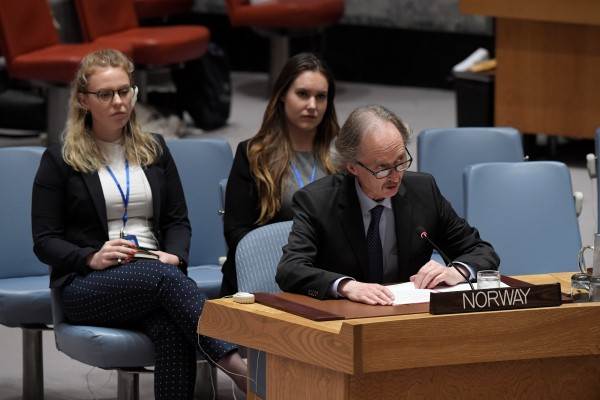Mr. President,
I have the honour of speaking on behalf of Denmark, Finland, Iceland, Sweden, and my own country, Norway.
I would like to express our gratitude to Uruguay for convening this debate. I thank the Secretary-General for his remarks and report on the protection of civilians in armed conflict. I also express my appreciation to Ms. Christine Beerli from the ICRC and Mr. Bruno Stagno Ugarte from Human Rights Watch for their informative remarks and for calling us to action.
As highlighted in the Secretary-General’s report, recent armed conflicts have seen state and non‐state armed groups defying international law by directly targeting civilians and civilian objects. This has led to indescribable acts of violence and brutality, and caused human suffering and carnage on an unprecedented scale.
The backdrop for our current debate is the one-year anniversary of the Security Council’s adoption of resolution 2286 on healthcare in armed conflict. The resolution sent a resounding message: The wounded and sick, medical and humanitarian personnel, as well as hospitals and other medical facilities, must be respected and protected.
States are responsible for implementing resolution 2286. This requires putting in place the requisite legal and operational measures. The Nordic countries are committed to the Secretary-General’s recommendations on implementing resolution 2286. We call on all Member States to do the same.
Attacks against medical personal must be understood as part of a broader trend where civilians increasingly are subjected to attacks in armed conflict, where it becomes a tactic of war. Our common resolve to confront such acts must be unequivocal. There are no simple solutions. Our response must be carefully calibrated and effective.
Let me emphasize seven points of particular importance.
First, we must ensure full respect for international law, especially humanitarian law, human rights law and refugee law. International law protects the delivery of humanitarian aid, providing medical care, it mandates protection of refugees, displaced persons and migrants and it protects civilians from harm. Compliance with international law is therefore paramount. We remain committed to the initiative by Switzerland and the ICRC on Strengthening Compliance with international humanitarian law.
We must enhance respect for international law by parties to armed conflict. This requires that we understand the changing nature of conflict. Armed conflicts are increasingly being fought in urban areas with devastating consequences for civilians. We share the concern of the Secretary-General and call on States and non-state parties to armed conflicts to prevent civilian harm resulting from the use of wide-area explosive weapons in populated areas.
Second, we must ensure that those who violate international law are held accountable. If States are unwilling or unable to prosecute such crimes, they must be referred to the International Criminal Court.
Third, parties to a conflict must allow and facilitate rapid and unimpeded passage of humanitarian relief. The international community must unequivocally condemn and take effective measures against attacks on health care personnel. International Red Cross and Red Crescent Movement’s initiative ‘Health Care in Danger’ should be universally supported.
Fourth, we must meet the humanitarian challenges posed by the historically high number of irregular migrants, refugees, and internally displaced people. Our humanitarian response must be effective, efficient and fully able to meet urgent humanitarian needs and promote sustainable solutions.
Fifth, States must fulfil their responsibility to protect children from armed conflict and take action to address violations and abuses. This includes protecting the right to education and schools from attacks. Our children deserve the right to pursue a better future through education, also when their grown-ups cannot make peace. We urge all States to join the Safe Schools Declaration, now endorsed by 64 States.
Sixth, we must recognize that gender equality and women’s participation is critical to peaceful societies. We must actively involve women in political and economic decision-making. Women and men must be heard and respected equally.
Seventh, we must address the root causes of conflict, violent extremism and terrorism. That entails ensuring respect for human rights, upholding the rule of law and strive for sustainable development and socio-economic opportunities without discrimination of any groups.
Thank you.
